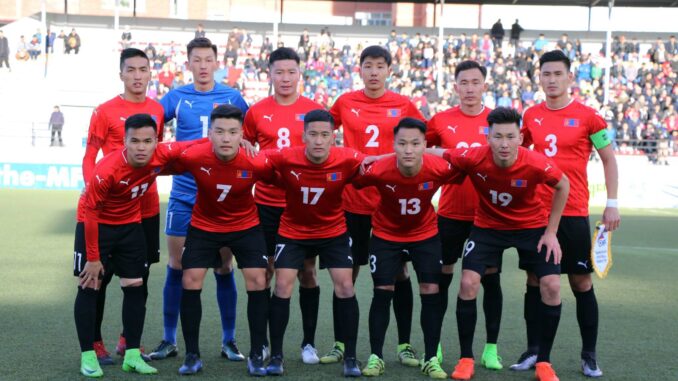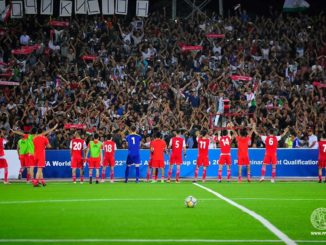
We’re about to hit what should have been the half way point along the Road to Qatar 2022 and while no one could’ve expected it to transpire as it has done so far, with only one match being played in the last 16 months, the rise of Mongolian football remains an interesting subplot to a campaign that has yet to really hit its stride.
March’s FIFA World Cup qualifiers will be the first chance that many have had for competitive football since the global COVID pandemic engulfed us all over 12 months ago.
While the AFC optimistically hoped that we’d have returned to “business as usual” by this point, in reality only three of the slated 16 ties will go ahead as planned this international week.
The remainder of the Round 2 ties have been postponed for a fourth time until June for the growingly contentious centrally hosted culmination.
With a limited narrative set as the backdrop to this month’s qualifiers, Mongolia (currently ranked 190th by FIFA) sit centre stage, participating in two of the three active WCQs over the coming week.
Mongolia seem to have accidentally found themselves as a willing passenger in their more illustrious group opponents’ progression plans.
Having to travel from Ulaanbaatar to Dushanbe to Tokyo and the back again, including a minimum of six clear COVID test rounds across the week to navigate, there’s a clear reason why no other side is playing away twice this window.
But for Mongolia there is an air of optimism to bolster their stride, with this cycle marking a pivotal period in their footballing progression.
For the first time in their history, Mongolia made it through to the second round of World Cup qualifying, clinching a 3-2 aggregate playoff win (including the very first goal of the entire cycle) over Brunei, putting to bed decades of frustration and stunted development.
Up until now, the stumbling block of preliminary stage elimination has regularly been the thorn in their side.
Ahead of the 2014 World Cup they were narrowly eliminated by Myanmar (giving away a 1-0 first leg lead to lose 2-1), whilst for the 2018 World Cup, despite going down in the history books as official victors they lost out on the pitch to East Timor, a side infamously jam packed with illegitimate foreign legionnaires.
While East Timor were thrown out, it was too late for Mongolia to progress in their place. Talk about a lose-lose situation.
Such fine margins are one thing to deter confidence, but the lack of competitive play (three years plus in between worthwhile matches in some cases), allowed Mongolia, like many before them, to drift off into obscurity, becoming the well worn and clichéd footballing backwater.
The spark of change came in 2017 with the appointment of German coach Michael Weiss. The former Philippines boss was a significant enough name in Asian football, with a reputation to engage and promote the game in his local vicinity, something Mongolia severely missed.
A structure slowly grew around the national team. Friendlies, a concept rarely pursued prior to Weiss’ appointment were being regularly organised, youth competitions were finally being taken seriously, while performances on the pitch saw the seniors grow from stride to stride.
By the time Tsedenbal Norjmoo hit his monumental freekick against Brunei to open the Road to Qatar back in September 2019, Weiss’ progress was fully up and running.
Mongolia’s form since, especially in Ulaanbaatar has been highly impressive for a side with so little experience at this level.
From the long travel involved for visitors, the unique climate and an impassioned and reinvigorated home support; an away trip to Mongolia has slowly become a far from desired travel destination.
They immediately clinched their first win at this stage – a 1-0 win over Myanmar (Mongolia once again scoring the first goal of an entire round) – while only narrowly missing out by a single goal in all but one of their other matches (the exception being a heavy but not entirely unexpected 6-0 reverse to Japan).
Their football is in your face; quick, direct and punchy. They haven’t got the physical advantage that Tajikistan and Kyrgyzstan have demonstrated in their group already, or the calm technical ability of Japan, but they have an intensity to which they hold their own.
They have individual influence also. The aforementioned Tsedenbal, the Mongolian captain and set piece specialist, has become the unlikely poster boy of the campaign so far, scoring three goals from left back thus far.
In front of him 20-year-old Dolgoon Amaraa, one of a few select players to make the transition from the juniors to the seniors alongside Weiss, blazes a trail down the left flank, while experienced goalscorer Nyam-Osor Naranbold, fresh off the back of a golden boot (29 goals in 18 matches) and domestic title winning campaign with Athletic 220 last year, completes a side that has plenty of threat across the whole pitch.
Their progress illustrates and underlines the importance of qualifying for the second round of FIFA World Cup qualifying. Mongolia have already played more qualifiers this cycle than the entirety of their last three (12 years) combined. Guaranteed competitive football gives way to an organised benchmark in which to follow; its hardly groundbreaking.
The blight to this cycle, of course, came in the shape of COVID. After three years in the role Michael Weiss left Mongolia at the start of the pandemic, not only leaving them without a highly experienced coach that drilled them so well on the pitch, but one who had such an influence in their structure off it.
A year down the track, with no further match experience to mention of but a new coach on board, Mongolia now face ahead of them a hectic week of travel and quarantine that could well end with them exiting World Cup qualification for the cycle.
Over the last couple of months, with a centralised venue increasingly becoming the exit strategy for the emerging bottle neck of the remaining Round 2 schedule, the highly political AFC realm became ever tinged with influence as the so called bigger nations went about stacking their cards accordingly to best place them for a safe passage through to the final rounds of qualification.
Mongolia, having switched their home tie with the Samurai Blue next Tuesday to Chiba, will return to Japan for a third time in June to tie up their schedule.
Under new Slovak coach Rastislav Bozik, Mongolia have an uphill task to still be relevant by that point.
Away trips to Tajikistan and Japan this week aren’t exactly inviting, yet arguably these are the just rewards for their progress to date; a chance to test their mettle against the very best in Asia.
Failing to clinch victory in either match, however, will see Mongolia bow out and shift focus to Asian Cup qualification.
While the stakes are against them, Mongolia, like Bhutan, Guam and Philippines before them, are becoming the feel good story of World Cup qualification.
Without a match under their belt for sixteen months now, a new coach onboard and an unenviable travel and quarantine schedule ahead of them, any point gained over the next week will be a party worth disrupting for the Blue Wolves from Ulaanbaatar.
Photo: FIFA




